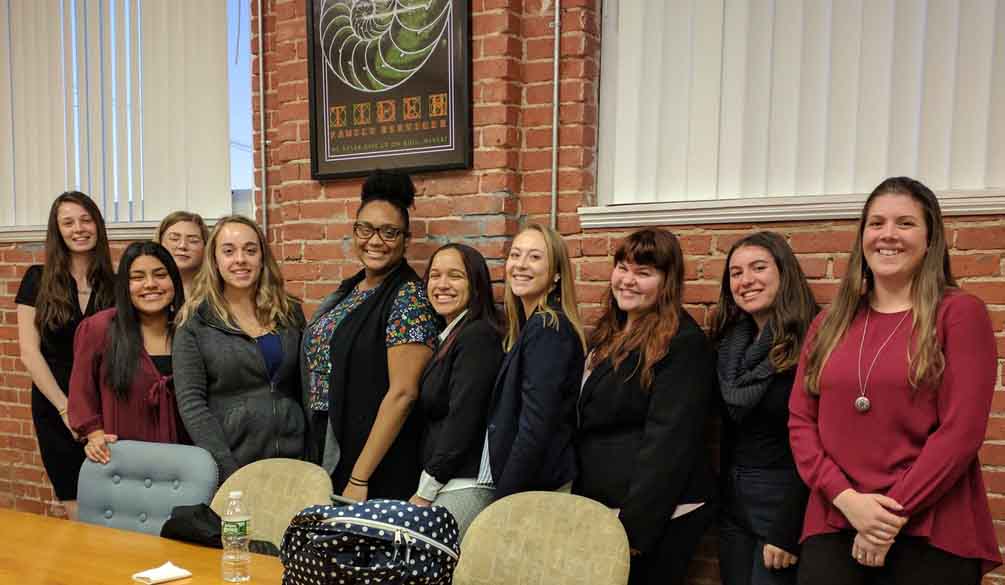KINGSTON, R.I., Feb. 15, 2018—The girl was angry all the time—in school, at home, with friends. When Chrissy Wagner stepped into her Providence house, she didn't know what to expect.
"Feelings Jenga"—a variation of the game "Jenga" in which players take turns building a tower of blocks—was placed on the dining-room table.
One by one, Wagner, a University of Rhode Island sociology and psychology major; the girl; and a behavior specialist picked up blocks, stamped with questions: What makes you angry? How do you settle down? Name a coping skill? They took turns answering.
"It was a great way for (the girl) to express what makes her angry, but also hear how adults handle anger," says Wagner. "In class we read textbooks and listen to lectures, but this is totally different. We're in the room."
That was the goal of a new J-term course offered during the winter break by Judy A. Van Wyk, a URI sociology professor who has been helping troubled children and teenagers for decades. Ten students, most studying sociology or criminal justice, spent five days immersed in the state's juvenile justice system.
They accompanied social workers on home visits, watched hearings in Family Court in Providence, observed teachers and students at Ocean Tides—a residential facility for boys in Narragansett—and attended presentations by social service agencies, including the Rhode Island Department of Children, Youth and Families, or DCYF.
Van Wyk says she created "Juvenile Justice Immersion" to give students an opportunity to see what it's like working in the social service field. An expert in the juvenile justice system, Van Wyk is co-author of the book, "Turning the Tide of Male Juvenile Delinquency: The Ocean Tides Approach."
"I really want to get students in there," says Van Wyk. "Students can't fully grasp what we're talking about in the classroom until they meet the kids and find out what they're going through."
The three-credit course was life-changing for the students.
"I went in thinking it would be interesting, but the course ended up impacting me more emotionally than I thought it would," says Emily Scofield, a senior from Harrison, N.Y., who is studying journalism and sociology. "It made me feel that going to college for this is worth it. These people need a way for their voices to be heard. The social workers give them that ability to have a voice."
Rory Burns, of Newport, a senior studying sociology with a focus on criminology, says the course gave her insight into "how these kids need structure and relationship-building."
"They need someone who is not going to give up on them," she says.
Besides helping a 6-year-old manage her anger, Wagner, a junior from Glocester, R.I., learned about the personal struggles of many troubled teenagers, and that they're often victims of family and street violence.
"Even though they've done bad things, they're still just children," says Wagner. "You can see the fear in their eyes. At the end of the day, they're just kids."
In Family Court, she found stern but compassionate judges. At Ocean Tides, she discovered that intense counseling helps many teenagers turn their lives around. And she learned from Ocean Tides' teachers that students must be willing to help themselves.
"In the end, it's their choice," says Wagner. "You can talk to a kid until you're blue in the face, but if he doesn't want to change, he won't."
One of the highlights of the course was talking to an employee who holds a senior position at DCYF, she says. Thanks to that meeting, she might do an internship at the state agency next fall.
"I've been at URI for three years, and all my classes have been great, but this experience put me there," says Wagner. "I was interacting with people."
Feedback from the students was so positive Van Wyk expects to offer the class again next year. The students will talk about their experiences March 1 at 4 p.m. in the Chafee Social Science Building, Room 273, 10 Chafee Road, on the Kingston campus. The event is free and open to the public.
"My parents told me I have a save-the-world complex," says Wagner. "Even if I make a difference in a few lives, that's making the world a better place."

